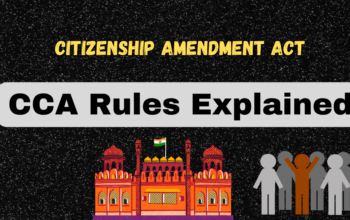Article 1 of the Indian Constitution is titled “Name and territory of the Union”. It states that India, that is Bharat, shall be a Union of States. The territory of India shall consist of:
- The States and the territories thereof specified in the First Schedule.
- The Union territories specified in the First Schedule.
- Such other territories as may be acquired.
The First Schedule of the Constitution lists the States and Union Territories of India. The States are further divided into Parts A, B, and C. Part A lists the States in the Indian Union at the time of the Constitution’s adoption in 1950. Part B lists the States that were subsequently formed out of Part A States. Part C lists the Union Territories.
Article 1 also states that Parliament may by law admit into the Union, or establish, new States on such terms and conditions as it thinks fit. This provision has been used to admit new States into the Union, such as Telangana in 2014 and Jammu and Kashmir in 2019.
Article 1 is one of the most important articles in the Indian Constitution. It establishes the basic structure of the Indian Union and sets out the fundamental principles on which the Union is founded.
What does Article 1 say about the name and territory of India?
Article 1 states that India, that is Bharat, shall be a Union of States. This means that India is a federal union of States, each of which has its own government and powers. However, the Union also has certain powers over the States, such as the power to make laws on matters of national importance.
The name “Bharat” is also mentioned in Article 1. This name is derived from the Sanskrit word “Bhāratavarsha”, which means “the land of the descendants of Bharata”. Bharata was a legendary king who is said to have ruled over a large part of the Indian subcontinent.
The use of the name “Bharat” in the Constitution is a way of acknowledging the country’s rich history and culture. It also reflects the desire of the framers of the Constitution to create a united and strong nation.
India may be renamed Bharat
It is in the news that Prime Minister Narendra Modi is likely to move a resolution renaming India as ‘Bharat’ at the five-day special session in Parliament starting September 18, 2023.
Meanwhile, an official dinner invite to G20 delegates from the Rashtrapati Bhawan surfaced on Tuesday. The invite had ‘President of Bharat’ written on it instead of the usual ‘President of India’.
The name “Bharat” is an ancient Indian name for the country. It is derived from the name of the legendary king Bharata, who is said to have unified the Indian subcontinent in the ancient times. The name Bharat is still widely used in India, especially in Hindi and other Indian languages.
The official name of the Republic of India is “Bhārat Gaṇarājya” in Sanskrit, which means “Republic of India”. However, the English name “India” is also commonly used.
What are the implications of Article 1 for the Indian Union?
Article 1 has a number of important implications for the Indian Union. First, it establishes the principle of federalism, which means that power is shared between the Union and the States. Second, it ensures the unity and integrity of India by making it clear that the States are part of the Union. Third, it gives the Union the power to admit new States into the Union, which can be used to address the needs of a changing society.
The use of the name “Bharat” in the Constitution
The use of the name “Bharat” in the Constitution is significant because it reflects the country’s rich history and culture. The name “Bharat” has been used for centuries to refer to the Indian subcontinent. It is also the name of the ancient kingdom that was ruled by Bharata.
The use of the name “Bharat” in the Constitution is a way of acknowledging the country’s past and its potential for a bright future. It is also a way of strengthening the sense of national identity among the people of India.
The importance of Article 1 for the unity and integrity of India
Article 1 is important for the unity and integrity of India because it establishes the principle of federalism and ensures that the States are part of the Union. This helps to prevent the rise of separatism and ensures that the country remains united.
Article 1 also gives the Union the power to admit new States into the Union. This can be used to address the needs of a changing society and to ensure that the Union remains strong and united.
Conclusion
Article 1 is one of the most important articles in the Indian Constitution. It establishes the basic structure of the Indian Union and sets out the fundamental principles on which the Union is founded. Article 1 is essential for the unity and integrity of India, and it will continue to be an important part of the Constitution for many years to come.
I hope this article has been informative. Thank you for reading.




Hello, i think that i saw you visited my weblog so i came to ?eturn the favor텶’m trying to find things to improve my web site!I suppose its ok to use some of your ideas!!